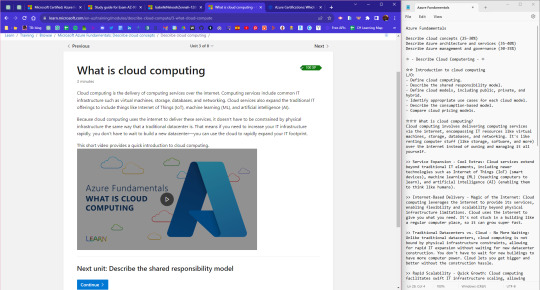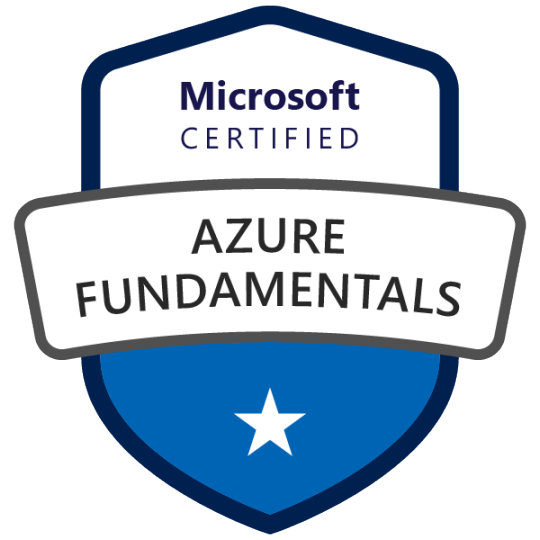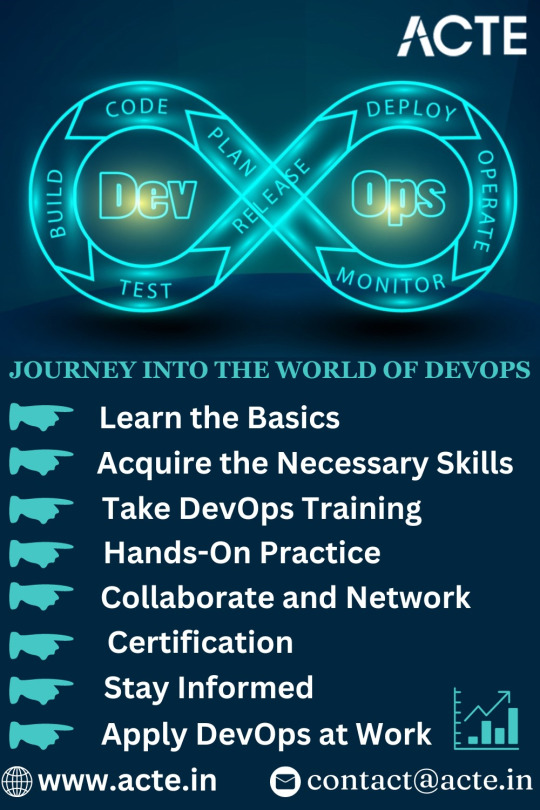#Azure fundamentals certification
Explore tagged Tumblr posts
Text
Azure Fundamentals Certification
In the ever-evolving landscape of technology, cloud computing has become the cornerstone of innovation, with Microsoft Azure at its forefront. Azure Fundamentals certification serves as your gateway to understanding and navigating this dynamic realm.
Tailored for beginners, this certification empowers you with foundational knowledge of Azure's core concepts and services. You'll gain insights into cloud principles, virtual machines, data storage, and more, setting the stage for deeper exploration.
Azure Fundamentals certification isn't just an entry point; it's a stepping stone towards a rewarding career in cloud technology. By mastering the basics, you lay a solid foundation to pursue advanced Azure certifications and shape the future of cloud solutions.
Embrace the opportunity to bolster your skills, enhance your employability, and contribute to the digital transformation. Azure Fundamentals certification equips you to embark on a transformative cloud journey that opens doors to exciting possibilities.
0 notes
Text
https://www.bookmarkmonk.com/story/best-az-900-certification-scholarhat/
Your ability to design, plan, and scale your web applications on Microsoft Azure is enhanced through the Microsoft Certified Azure Fundamentals Training Program. It contains instruction on the fundamental Azure services, fundamental Azure solutions, fundamental Azure administration tools, fundamental Azure network security features, fundamental Azure identity, governance, and privacy features, and fundamental Azure cost management and Service Level Agreements.
0 notes
Text
0 notes
Text
MICROSOFT AZURE FUNDAMENTALS AZ-900 (PART 2)
Consumption based models
Two types of expenses to consider
Capital Expenditure (CapEx)
Typically one time up front expenditure to purchase secure tangible resources
Example: repaying your parking lot, building data center
Operational Expenditure (OpEx)
Spending money on services or products over time.
Examples: Renting a convention center, lease a company vehicle, sign up for cloud services
Cloud computer is OpEx because it operations on a consumption based model.
You pay for the IT services you use
Benefits of a consumption based model
No upfront costs
No need to purchase and manage infrastructure that may not be used to its full potential
Ability to pay for more resource when they are needed
Ability to stop paying for resources that are no longer needed
No need to worry about planning (over estimating or under estimating for use of a data center)
This model helps you pay for your cost based on services you use
Plan and manage operating costs
Run your infrastructure more efficiently
Scale as your business needs change
Benefits of high availability and scalability in the cloud
Two biggest considerations when building or deploying a cloud application are: uptime(availability) and handling demand (scale)
High availability
Focuses on ensuring maximum availability, regardless of disruptions or events that may occur
When architecting the solution, account for service availability guarantees.
Azure is a height available cloud environment with uptime guarantees depending on the service (Part of the SLA agreement)
Service Level Agreement (SLA)
Formal agreement between customer and service provider.
Also used inside organizations between IT and business
Provided on uptime % ie 100% uptime
Also has downtime information and credits you may get then
100% uptime is expensive and hard. Thus 99% or 99.9% or 99.95% is common.
99% vs 99.99% has a difference.
99% down 1.6 hrs per week/7.2 per month
99.9% down 10 mins per week/43.2 per month
More expensive for higher availability
Scalability
Major benefit is the scalability of cloud computing
Scalability refers to the ability to adjust resources to meet demand
Another benefit, you are not over paying for services and only paying for what your using
Horizontal Scaling
adding or removing resources
Needing more CPUs or more RAM
Vertical Scaling
increase or decrease the capabilities of the resource
Needing more virtual machines or containers.
Reliability
Ability of a system to recover from failures and continue to function
Cloud is decentralized by design and supports reliable and resilient infrastructure
Even if one region has a catastrophic event, other regions can be up and operating
Predictability
Move forward with confidence
Performance predictability - Auto scaling, load balancing, and high availability
Cost predictability
Forecasting cloud spend
Use analytics to find patters in your use to allow for better planning of resource deployments
Can predict the Total Cost of ownership(TCO)
Pricing calculator to get an estimate of potential cloud spend
0 notes
Text
Microsoft Azure Fundamentals

Thursday 17th august 2023
Dad has got me trying to get the Microsoft Azure Fundamentals certification! If you know me, I love my name on certificates so I am trying it out! I haven't been too much into cloud computing so I guess this is a good opportunity to actually learn and see what it's all about.
I know the bare basics that it's storing things not at the company?? Like at work, they store everything in Azure. Again, I may be wrong with the definition - that's why I'm learning!
Learning new things can be fun! ˙˚ʚ(´◡`)ɞ˚˙
#xc: studies#azure studies#codeblr#coding#progblr#programming#studyblr#studying#computer science#microsoft azure#azure certification#tech#cloud computing
31 notes
·
View notes
Text
Another exam passed!

I've scored myself Microsoft's Azure Fundamentals (AZ-900) certification, and now I have a solid grasp on cloud computing. This will look great on my CV!
2 notes
·
View notes
Text
How to Become a Cloud Computing Engineer
Introduction:
Cloud computing has become a cornerstone of modern IT infrastructure, making the role of a Cloud Computing Engineer highly in demand. If you're looking to enter this field, here's a roadmap to help you get started:
Build a Strong Foundation in IT A solid understanding of computer networks, operating systems, and basic programming is essential. Consider getting a degree in Computer Science or Information Technology. Alternatively, Jetking offer you to make your career in Cloud computing Courses and gain the technical knowledge needed.
Learn Cloud Platforms Familiarize yourself with popular cloud service providers such as AWS (Amazon Web Services), Microsoft Azure, and Google Cloud. Many platforms offer certification courses, like AWS Certified Solutions Architect, which will help validate your skills.
Gain Hands-On Experience Practical experience is critical. Set up your own cloud projects, manage databases, configure servers, and practice deploying applications. This will give you the real-world experience that employers seek.
Master Programming Languages Learn programming languages commonly used in cloud environments, such as Python, Java, or Ruby. Scripting helps automate tasks, making your work as a cloud engineer more efficient.
Understand Security in the Cloud Security is paramount in cloud computing. Gain knowledge of cloud security best practices, such as encryption, data protection, and compliance standards to ensure safe operations and become Master in cloud computing courses.
Get Certified Earning cloud certifications from AWS, Azure, or Google Cloud can enhance your credibility. Certifications like AWS Certified Cloud Practitioner or Microsoft Certified: Azure Fundamentals can provide you a competitive edge.
Keep Learning Cloud technology evolves rapidly, so continuous learning is key. Stay updated by taking advanced courses and attending cloud tech conferences.
Join Jetking today! Click Here
By building your expertise in these areas, you’ll be well on your way to a successful career as a Cloud Computing Engineer!
2 notes
·
View notes
Text
Azure DevOps Training
Azure DevOps Training Programs

In today's rapidly evolving tech landscape, mastering Azure DevOps has become indispensable for organizations aiming to streamline their software development and delivery processes. As businesses increasingly migrate their operations to the cloud, the demand for skilled professionals proficient in Azure DevOps continues to soar. In this comprehensive guide, we'll delve into the significance of Azure DevOps training and explore the myriad benefits it offers to both individuals and enterprises.
Understanding Azure DevOps:
Before we delve into the realm of Azure DevOps training, let's first grasp the essence of Azure DevOps itself. Azure DevOps is a robust suite of tools offered by Microsoft Azure that facilitates collaboration, automation, and orchestration across the entire software development lifecycle. From planning and coding to building, testing, and deployment, Azure DevOps provides a unified platform for managing and executing diverse DevOps tasks seamlessly.
Why Azure DevOps Training Matters:
With Azure DevOps emerging as the cornerstone of modern DevOps practices, acquiring proficiency in this domain has become imperative for IT professionals seeking to stay ahead of the curve. Azure DevOps training equips individuals with the knowledge and skills necessary to leverage Microsoft Azure's suite of tools effectively. Whether you're a developer, IT administrator, or project manager, undergoing Azure DevOps training can significantly enhance your career prospects and empower you to drive innovation within your organization.
Key Components of Azure DevOps Training Programs:
Azure DevOps training programs are meticulously designed to cover a wide array of topics essential for mastering the intricacies of Azure DevOps. From basic concepts to advanced techniques, these programs encompass the following key components:
Azure DevOps Fundamentals: An in-depth introduction to Azure DevOps, including its core features, functionalities, and architecture.
Agile Methodologies: Understanding Agile principles and practices, and how they align with Azure DevOps for efficient project management and delivery.
Continuous Integration (CI): Learning to automate the process of integrating code changes into a shared repository, thereby enabling early detection of defects and ensuring software quality.
Continuous Deployment (CD): Exploring the principles of continuous deployment and mastering techniques for automating the deployment of applications to production environments.
Azure Pipelines: Harnessing the power of Azure Pipelines for building, testing, and deploying code across diverse platforms and environments.
Infrastructure as Code (IaC): Leveraging Infrastructure as Code principles to automate the provisioning and management of cloud resources using tools like Azure Resource Manager (ARM) templates.
Monitoring and Logging: Implementing robust monitoring and logging solutions to gain insights into application performance and troubleshoot issues effectively.
Security and Compliance: Understanding best practices for ensuring the security and compliance of Azure DevOps environments, including identity and access management, data protection, and regulatory compliance.
The Benefits of Azure DevOps Certification:
Obtaining Azure DevOps certification not only validates your expertise in Azure DevOps but also serves as a testament to your commitment to continuous learning and professional development. Azure DevOps certifications offered by Microsoft Azure are recognized globally and can open doors to exciting career opportunities in various domains, including cloud computing, software development, and DevOps engineering.
Conclusion:
In conclusion, Azure DevOps training is indispensable for IT professionals looking to enhance their skills and stay relevant in today's dynamic tech landscape. By undergoing comprehensive Azure DevOps training programs and obtaining relevant certifications, individuals can unlock a world of opportunities and propel their careers to new heights. Whether you're aiming to streamline your organization's software delivery processes or embark on a rewarding career journey, mastering Azure DevOps is undoubtedly a game-changer. So why wait? Start your Azure DevOps training journey today and pave the way for a brighter tomorrow.
5 notes
·
View notes
Text
"Navigating the Cloud: Choosing the Best AZ-900 Training in Australia"
Introduction :
AZ900 certification will expand your career in today’s highly competitive business market, especially in cloud computing. Because it provides a strong base for cloud services and Microsoft Azure services, the Microsoft Azure basics AZ-900 certification is in high demand.
This will definitely help in choosing an Australian training program, making sure that we get the guidance and support we need to pass the process.
Understanding the "AZ900 Certification":
Those who wish to prove that they comprehend cloud ideas, core Azure services, Azure pricing, SLA, and lifecycle are intended to take the AZ-900 certification. This certification offers a strong basis for additional education and professional progression within the Azure ecosystem, and it also acts as a bridge to other, more specialized Azure credentials.

Why AZ-900 Certification Is Important
Validation of Azure Fundamentals:
Earning the AZ-900 certification validates your expertise in Azure services and core cloud principles, making you a valuable asset to any enterprise that uses Azure
Career advancement:
Getting licensed with AZ-900 allows you to consciousness on learning about cloud technology. This can result in new task opportunities and assist you pass ahead on your profession. Employers see AZ-900 certification as a signal of your capabilities and readiness to work with Azure technology, making you a desirable candidate for jobs.
Selecting Australia's Top AZ-900 Training Program:
When choosing an AZ-900 training course, it is important to consider several factors to ensure you receive the best instruction and support to match your learning needs:
Accreditation: Look for trainers who are accredited by Microsoft and have a history of excellent training courses.
Course topics: Ensure that the syllabus fully addresses each topic included in the AZ-900 exam objectives by observation.
Instructor Expertise: Make sure to check the qualifications and experience of the instructors who are teaching the course. This ensures they have the necessary skills and knowledge to teach the subject effectively.
Delivery Format: Consider how you prefer to learn and choose a course that offers different ways of learning. This could include live virtual sessions, online self-paced learning, or in-person classes.
Essential Components of the Top AZ-900 Training Program:
Broad Curriculum: The top AZ-900 training program will thoroughly cover every exam goal and give you a strong foundation in Azure principles.
Practical Labs: Engaging laboratories and tasks enable you to utilize theoretical understanding in practical situations, strengthening your education and enhancing your abilities.
Proficiency in Teaching: Throughout the course, knowledgeable instructors with a background in the business offer insightful commentary and practical advice, facilitating your understanding of challenging ideas.
Choice of Flexible Learning Options: Choose a training program that gives you the freedom to practice whenever it is most convenient for you.
Exam preparation: To help you feel confident and well prepared on exam day, we’ve armed you with effective resources, including practice tests and exam tips.

Advantages of Gaining AZ-900 Certification
Professional Prospects:
Holding the AZ-900 certification gives you access to various levels of cloud computing including Azure Developer, Cloud Administrator and Cloud Solution Architect
Potential Salary:
Due to the increased value and demand of their talents in the labor market, certified professionals frequently command higher pay than their non-certified counterparts.
Professional Development:
By showcasing your dedication to ongoing observe and certification, you undertaking to capability employers which you are a lifelong learner.
Opportunities for Networking:
becoming a Certified Azure Professional provides access to many resources and networking opportunities for professional development.
In conclusion,
For anyone looking to start or buy an existing cloud computing company, it’s worth the investment to get AZ-900 certified. You can choose a top AZ-900 training course in Australia and be confident of receiving the great advice and support you need to pass your certification program.

FAQs
Questions Frequently Asked About Our Training Services:
What aspects of cloud computing do you teach?
The definition, traits, deployment patterns, and service models of cloud computing are among the core ideas and concepts that we instruct students in.
Which advantages of utilizing cloud services are included in your training, and how can one obtain them?
Absolutely, throughout our training sessions, we go over the many advantages of employing cloud services, including scalability, cost-effectiveness, flexibility, and improved security.
Could you provide more details on the kinds of cloud services you instruct?
Sure, please respond.We cover the abilities and usage problems of diverse cloud services, including infrastructure as a provider (IaaS), platform as a provider (PaaS), and software as a carrier (SaaS).
Which fundamental Azure architectural elements are covered in your training?
In order to give students a thorough grasp of Azure architecture, our course covers the fundamental architectural elements of Azure, such as regions, availability zones, resource groups, and Azure subscriptions.
Do you offer instruction on networking and computing services offered by Azure?
Yes, we provide thorough training on Azure networking services including Azure VPN Gateway, Azure Load Balancer, and Virtual Network (VNet), as well as Azure compute services like virtual machines, Azure App Service, and Azure Kubernetes Service (AKS).
How about the storage services offered by Azure? Do you cover these in your training?
In response, yes. We cover each element of Azure garage offerings, which includes Azure Blob Storage, Azure Files, Azure Queue Storage, and Azure Table Storage, in detail during our session.
In your training, how do you cover Azure identity, access, and security topics?
To make certain a sturdy emphasis on security quality practices, we provide in-depth training on Azure identification and get admission to management. Topics protected include Azure Active Directory (AAD), role-based totally get right of entry to manipulate (RBAC), Multi-Factor Authentication (MFA), and Azure Security Center.
Could you elaborate on how your training covers cost management in Azure?
Sure, possibly respond. In order to assist businesses optimize their return on investment while reducing expenses, we train efficient cost management strategies in Azure, such as Azure Cost Management+ Billing, budgeting, resource tagging, and optimization techniques.
Which Azure governance and compliance features and tools are addressed in your training?
In order to make certain compliance with regulatory requirements, our training covers a whole lot of Azure governance and compliance abilities and technology, together with Azure Policy, Azure Blueprints, Azure Security Center, and compliance certifications like GDPR and HIPAA.
Do you offer instructions on the tools and functionalities used to deploy and manage Azure resources?
In-depth training on Azure useful resource management and deployment abilities and tools, which includes Azure Resource Manager (ARM), Azure PowerShell, Azure CLI, Azure DevOps, and Infrastructure as Code (IaC) standards, is to be had upon request.
In your training, which Azure monitoring tools are covered and in what way are they addressed?
In order to offer insights into the general performance, availability, and security of Azure assets, we address a number of Azure tracking gear, together with Azure Monitor, Azure Log Analytics, Azure Application Insights, and Azure Security Center.
2 notes
·
View notes
Text
You become skilled at creating, organising, and growing your online applications on Microsoft Azure after completing the Microsoft Certified Azure Fundamentals Training Program. The programme covers fundamental Azure services, fundamental Azure solutions, fundamental Azure administration tools, fundamental Azure security and network security features, fundamental Azure identity, governance, privacy, and compliance features, and fundamental Azure cost management and SLAs.
0 notes
Text
https://www.anibookmark.com/site/best-az-900-certification-scholarhat-ab1016992.html
You become skilled at creating, organising, and growing your online applications on Microsoft Azure after completing the Microsoft Certified Azure Fundamentals Training Program. The programme covers fundamental Azure services, fundamental Azure solutions, fundamental Azure administration tools, fundamental Azure security and network security features, fundamental Azure identity, governance, privacy, and compliance features, and fundamental Azure cost management and SLAs.
0 notes
Text
youtube
#az900#azure fundamentals#certification#technology#azure#youtube#microsoft#azure devops#microsoft azure#Youtube
0 notes
Text
Navigating the Data Landscape: A Deep Dive into ScholarNest's Corporate Training

In the ever-evolving realm of data, mastering the intricacies of data engineering and PySpark is paramount for professionals seeking a competitive edge. ScholarNest's Corporate Training offers an immersive experience, providing a deep dive into the dynamic world of data engineering and PySpark.
Unlocking Data Engineering Excellence
Embark on a journey to become a proficient data engineer with ScholarNest's specialized courses. Our Data Engineering Certification program is meticulously crafted to equip you with the skills needed to design, build, and maintain scalable data systems. From understanding data architecture to implementing robust solutions, our curriculum covers the entire spectrum of data engineering.
Pioneering PySpark Proficiency
Navigate the complexities of data processing with PySpark, a powerful Apache Spark library. ScholarNest's PySpark course, hailed as one of the best online, caters to both beginners and advanced learners. Explore the full potential of PySpark through hands-on projects, gaining practical insights that can be applied directly in real-world scenarios.
Azure Databricks Mastery
As part of our commitment to offering the best, our courses delve into Azure Databricks learning. Azure Databricks, seamlessly integrated with Azure services, is a pivotal tool in the modern data landscape. ScholarNest ensures that you not only understand its functionalities but also leverage it effectively to solve complex data challenges.
Tailored for Corporate Success
ScholarNest's Corporate Training goes beyond generic courses. We tailor our programs to meet the specific needs of corporate environments, ensuring that the skills acquired align with industry demands. Whether you are aiming for data engineering excellence or mastering PySpark, our courses provide a roadmap for success.
Why Choose ScholarNest?
Best PySpark Course Online: Our PySpark courses are recognized for their quality and depth.
Expert Instructors: Learn from industry professionals with hands-on experience.
Comprehensive Curriculum: Covering everything from fundamentals to advanced techniques.
Real-world Application: Practical projects and case studies for hands-on experience.
Flexibility: Choose courses that suit your level, from beginner to advanced.
Navigate the data landscape with confidence through ScholarNest's Corporate Training. Enrol now to embark on a learning journey that not only enhances your skills but also propels your career forward in the rapidly evolving field of data engineering and PySpark.
#data engineering#pyspark#databricks#azure data engineer training#apache spark#databricks cloud#big data#dataanalytics#data engineer#pyspark course#databricks course training#pyspark training
3 notes
·
View notes
Text
Microsoft Azure Fundamentals AZ-900 (Part 1)
I recently took on the challenge of applying myself to pass the Azure Fundamentals AZ-900 exam. Every day on a daily basis I work with Azure and AWS, but I had never felt the need to pursue these certifications.
Over the last two weeks I reviewed the Microsoft Learning content for the Azure Fundamentals certification and recently passed it on my first attempt.
Below are the notes I had captured that helped me. Hopefully it can help you as well. Even if one person finds these valuable, then I will be happy that I shared them. :)
The content from my notes will be shared across several posts.
Cloud computing
Power and features to run your software
PC is in the cloud provider data center vs you
Pay for services you use
Others manage up keep of computer
Basic services are compute and storage
Compute power
How much processing your computer may do
Pay for resources you use
Storage
Volume of data you can store on your computer
Over time you need more, here you can request more
They make backups and ensure your system is up to date.
Shared responsibility model
Responsibilities are shared between the cloud provider and the consumer
Cloud provider: physical security, power, cooling, network connectivity
Consumer: data and information stored in cloud, access security
Mixed: example SQL server, the provider is responsible for the sql server, but the customer is responsible for the data
Different Models
IaaS - Infrastructure as a service
Consumer: Most responsibility
Provider: responsible for basics: physical security, power, connectivity, etc.
PaaS - Platform as a service
Middle ground
SaaS - Software as a service
Consumer: access, data, etc.
Provider: Most responsibility
Consumer is always responsible for
Information and data
Devices that are allowed to connect to your cloud
The accounts and identities of the people, services, and devices within the organization
Cloud provider is always responsible for
Physical data center
Physical network
Physical hosts
Your service model will determine responsibility for things like
Operating system
Network controls
Applications
Identity and infrastructure
Define Cloud models
Private Cloud
Similar to a traditional data center
Delivers services to a single entity
Greater control for the company of its IT department
More expensive and fewer benefits of a public cloud
Can be hosted at your on-site datacenter or at a third party facility
Public Cloud
Built, controlled, and maintained by a third party provider
Anyone that wants to purchase services can purchase them
Hybrid Cloud
An environment that uses both public and private clouds in an inter-connected environment.
Hybrid cloud environments can be used to allow private cloud to surge for increased temporary demand by deploying public cloud resources
Can provide an extra layer of security
Multi-cloud
Use of multiple public cloud providers
Use of different features at each provider
Starting your cloud journey with one provider and then migrating later
You manage resources and security in two environments
0 notes
Text


2WeeksStudy - Day 1 (01/09/2023)
Hiya 💗 I decided to make this challenge for myself where I would have to study at least 1 hour a day on any programming subject/language for 2 weeks (14 days) straight!
🤍 What subjects/topics do I plan to study in this challenge?
I have a bunch of ideas but I think these are the most important ones for now:
♥ - Microsoft Azure Fundamentals Certification preparations ♥ - Foundational C# with Microsoft on FreeCodeCamp ♥ - SheCodes Plus ♥ - Computer Science career path on Codecademy
I'll make a proper schedule so that I can tackle one by one effectively! The hardest one will be the Azure exam prep, as it's Cloud Computing and that's just a big mind block on it's own~!

#2weeksstudy challenge#codeblr#coding#programming#progblr#studying#studyblr#comp sci#computer science#study challenge#september study challenge
37 notes
·
View notes
Text
From Novice to Pro: Mastering DevOps for a Tech-Driven World
In today's rapidly evolving and technology-driven world, the intersection of software development and IT operations has assumed unprecedented significance. DevOps emerges as the key player in this scenario, not merely as a methodology, but as a transformative approach that unifies these critical aspects. With a resolute vision to enhance the software development lifecycle, promote collaboration, and facilitate the swift delivery of exceptional applications, DevOps stands as the linchpin of modern technology practices. If you find yourself eager to embark on a journey into the multifaceted realm of DevOps, rest assured that you've arrived at the right juncture. Here, we present you with an extensive roadmap to initiate your DevOps odyssey and, more importantly, to thrive in this vibrant and ever-evolving domain.

The Foundations: Learning the DevOps Basics
DevOps might sound complex, but it all begins with mastering the fundamentals. Start by familiarizing yourself with core concepts like automation, continuous integration, continuous deployment, and containerization. The internet is your treasure trove of resources, with countless articles, online courses, and books to help you grasp these essentials. Building a solid foundation in these areas is crucial as it forms the backbone of your DevOps knowledge.
Acquiring the Essential Skills
Once you're comfortable with the basics, it's time to roll up your sleeves and acquire the necessary skills. DevOps professionals are expected to be well-versed in several areas, such as scripting, automation tools (think Ansible, Puppet, or Chef), containerization (Docker), orchestration (Kubernetes), version control (Git), and cloud computing platforms (like AWS, Azure, or Google Cloud). It's like learning a new language, so patience and practice are key. Set up a testing environment and dive into each of these skills, experimenting and honing your abilities.
The Guiding Light: DevOps Training
While self-study is commendable, consider taking your knowledge to the next level through formal DevOps training. Numerous reputable organizations offer comprehensive DevOps courses, and one such standout is ACTE Technologies. These programs offer a holistic approach, covering not only theoretical aspects but also providing hands-on practical experience. The instructors leading these courses are typically seasoned DevOps professionals who can share invaluable insights and guidance, helping you navigate the intricacies of this dynamic field.
Learning by Doing: Hands-On Practice
DevOps is one domain where theory is essential, but practice is indispensable. Set up your development environment, work on creating automation scripts, and delve into the world of containerization and orchestration. Experiment with building and managing containers and dive deep into CI/CD (Continuous Integration/Continuous Deployment) pipelines. Real-world projects and scenarios serve as excellent opportunities to apply what you've learned, solidifying your skills and understanding.
The Power of Networking and Collaboration
DevOps is all about breaking down silos and fostering collaboration. Engage with the DevOps community by joining forums, communities, or LinkedIn groups dedicated to this discipline. Sharing experiences, learning from the challenges others have overcome, and networking with like-minded professionals can significantly accelerate your DevOps journey.
Adding Credentials: Certification
Depending on your career aspirations, pursuing DevOps certifications can add significant value to your profile. Certifications such as AWS Certified DevOps Engineer, Docker Certified Associate, or Kubernetes certifications can enhance your credibility and make you a more attractive candidate to potential employers. It's not just about gaining knowledge; it's about showcasing your commitment and competence.
Staying in the Know: Continuous Learning
The tech world is in a constant state of evolution, and DevOps is no exception. To excel in this field, it's essential to stay informed about industry trends and emerging tools and practices. Follow DevOps blogs, attend webinars, and participate in conferences or workshops. Your commitment to continuous learning is what will set you apart.
Applying DevOps in the Workplace
If you're already in the IT industry, leverage the power of DevOps by implementing its practices in your projects. Real-world experience is a significant asset, and it's an excellent way to make an immediate impact within your organization. Whether it's automating repetitive tasks or enhancing collaboration between development and operations teams, applying DevOps principles at work can be a valuable addition to your skill set.

In conclusion, DevOps is a transformative approach with the potential to supercharge your career in software development and IT operations. If you're looking for a trusted companion on your DevOps journey, turn to ACTE Technologies. This renowned training institution offers comprehensive courses that equip you with the knowledge and skills needed to excel in this dynamic field. Whether you're just taking your first steps into DevOps or you're on a quest to advance your career, ACTE Technologies can be your guide to success in the world of DevOps.
With this roadmap, you're well on your way to unlocking the doors of opportunity that DevOps can offer. Start your journey today and watch your career flourish in the ever-evolving tech landscape. Remember, the world of DevOps is yours to conquer.
5 notes
·
View notes